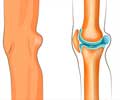The drug pregabalin (an anti-convulsant) significantly decreased patient pain while increasing and expediting mobility after surgery.
The drug pregabalin (an anti-convulsant) significantly decreased patient pain while increasing and expediting mobility after surgery, a new study has revealed.
Total knee replacement (TKR) is one of the most prevalent and painful orthopedic surgical procedures. While extremely successful in ultimately ending or minimizing knee pain and disability, the procedure can result in postoperative knee stiffness, mechanical failure, and severe, chronic pain.Asokumar Buvanendran, M.D., director of orthopaedic anaesthesia and associate professor of anaesthesiology, Rush University Medical Center, Chicago, Illinois, conducted the study with 60 TKR patients in two groups. One group received 300 milligrams of pregabalin two hours before surgery and 150 milligrams twice a day for 14 days following surgery. The other patients were given placebos at the same intervals. Both groups received pain medication through an epidural catheter during surgery and after surgery through a patient-controlled device.
The study found a “significant decrease” between the pregabalin and placebo groups in pain medication consumption in the 32 hours following surgery at all time points. The pregabalin group also consistently reported pain levels between 2 and 4 (on a scale of 1 to 10, with “10” being most severe) following surgery.
In addition, the patients’ knee range of motion (ROM) following surgery was higher in the pregabalin patients at hospital discharge: 84 degrees compared to 76 degrees among non-pregabalin patients. At 83 degrees a patient can climb stairs. According to Dr. Buvanendran, it typically takes a patient a full week to reach that level.
“(Administration of pregabalin ) decreased postoperative analgesic requirements while improving function,” Dr. Buvanendran said, adding that the ROM improvements are “especially important.”
“When you can walk up and down stairs, it makes a huge difference in patient quality of life,” he said. In addition, the improved range of motion allows patients to complete necessary post-surgical rehabilitation more quickly.
SRM/N
 MEDINDIA
MEDINDIA
 Email
Email









